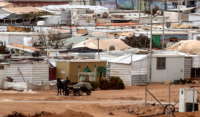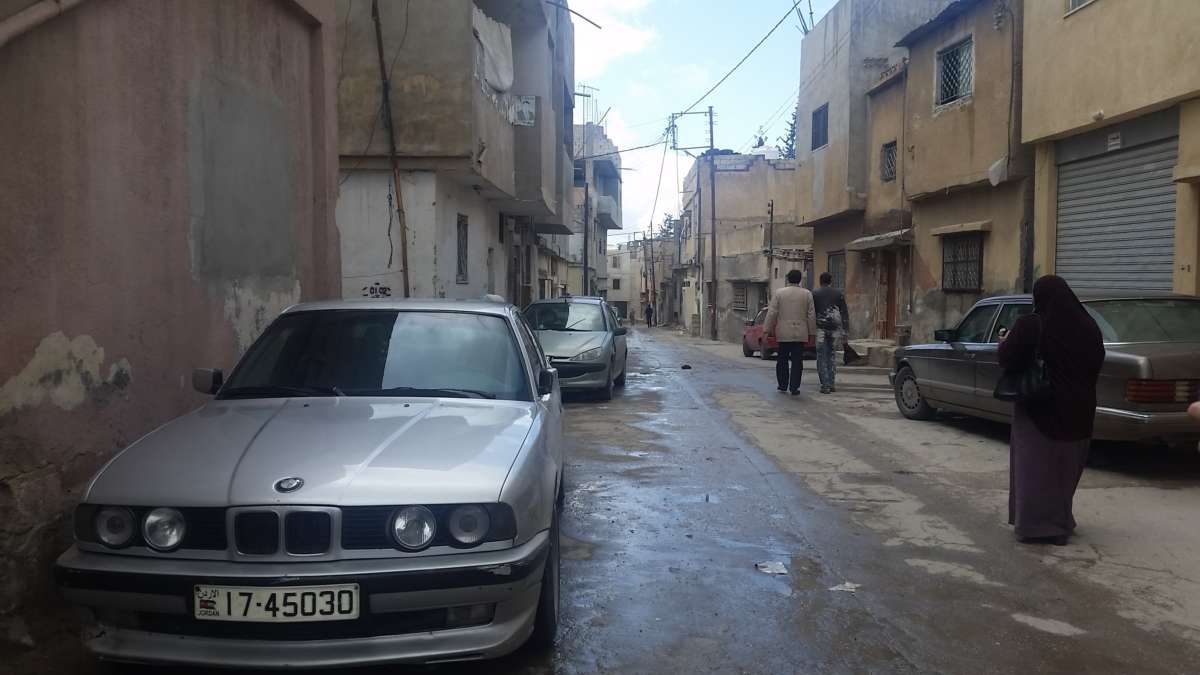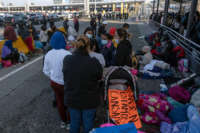AMY GOODMAN: This is Democracy Now!, democracynow.org, The Quarantine Report. I’m Amy Goodman. You can sign up for our daily news digest email by texting “democracynow” — one word, no space — to 66866. We’ll send you our news headlines and stories every day, as well as news alerts.
At least 10 Palestinians from the same extended family died Saturday when Israel bombed the Gaza refugee camp al-Shati. Eight of the victims were children. One 5-month-old baby named Omar was pulled from the rubble alive. His mother and four of his siblings were killed. This is Omar’s father, Mohammad Al-Hadidi.
MOHAMMAD AL-HADIDI: [translated] They targeted the house they were in. There were no rockets there, just women and children; no rockets, just peaceful children celebrating Eid. What have they done to deserve this? A rocket hit their house, over their heads, without warning or communication. Three whole floors fell over them, and we had to recover their body parts. … I call on the international community, those who support human rights and children’s rights and democracy, those who penalize anyone who harms a child, to look to our children here who are being bombed with strikes that drop entire floors onto people who we have to recover their body parts.
AMY GOODMAN: We’re joined now in Gaza by Matthias Schmale, the director of operations for UNRWA, the United Nations Relief and Works Agency for Palestinian Refugees.
Can you talk about what happened, not only there, but what’s happening to children, to the Palestinians in Gaza?
MATTHIAS SCHMALE: Good afternoon, Amy. And thank you for giving me this opportunity to talk to you.
Look, the way I describe this is we’ve had seven days of war. This is war. We are not close to war. We are in a military confrontation. This is war. And I think, as you just heard from Refaat, the citizens of Gaza are experiencing this in a terrified manner. It’s terror from the skies, what’s going on here. And you mentioned the house that was leveled in Beach camp, our refugee camp. Six of those children were children that went to UNRWA schools. So it hits home very directly. Some of my staff knew the family. And these six children are among 18 children that we now have confirmed that went to UNRWA schools. So, what I am trying to get to with all of this is the price the civilian population is paying for this is unacceptable. This has to stop. This is terror on a civilian population.
We also have to then think about the people who have fled their homes out of fear. A few nights ago, there was heavy fighting in the north. There were rumors of a tank — of a ground invasion by the Israelis, and thousands of people left their homes in fear, not necessarily because they were destroyed, as I understand it — I will come back to that — but in fear of what will fall from the sky next. And we now have, today, three days later or so, 41,000 and more people in 50 of our schools. Unfortunately — well, fortunately, the population, remembering also 2014, sees the blue of the United Nations and buildings that have a blue U.N. flag on it as still a relatively safe place, safer than their own home. So, that is what is happening. As UNRWA, we are trying our best to stand up our teams that will manage these centers properly and provide the necessary assistance. There are some immediate needs, like protection, including protection from COVID — of course, COVID is far from over — as well as safe water, the basic needs you need to have covered if you are in a shelter away from home.
Then you’ve also talked about people who have actually lost their home. The last I heard is that at least 600 families are not able to go back. So, many of the people who are at the moment in our shelters could go back if there is a ceasefire, but there is a group of at least 600 families and households that couldn’t because either their house is totally destroyed or it’s too damaged to go back. And, you know, allow me to make a point there. The Israelis claim — and correctly on this point — that they often warn. They don’t always, like the Beach camp hit was without warning, as far as I know. But they have warned, on other high-rise buildings, civilians to get out. So, in those terms, they protect their lives. But they have lost their homes. They are now without a home. And it’s completely senseless and mind-boggling.
So, that is the situation on the ground. I cannot as eloquently, of course, as Refaat describe the impact on the civilian population. He is directly affected. I can only say to you I hear a lot about traumas. One of my colleagues texted me, very movingly, saying, as a family, they now sleep on the same mattress in the central part of their home, just because they want to die together, if that happens.
AMY GOODMAN: Matthias, you talked about people responding to a rumor that Israel is invading, but this was not just a rumor. Israel, the military, directly put that out. The headlines of The New York Times, “A Press Corps Deceived, and the Gaza Invasion That Wasn’t”; The Washington Post, “Israel told the media it had ground forces in Gaza. Then it changed the story”; AP, “Israeli military accused of using media to trick Hamas.” You’re talking about the human toll of that trick. Can you explain further the significance of them putting this out and tens of thousands of Palestinians fleeing?
MATTHIAS SCHMALE: Yeah, I mean, I can only say, if they indeed — “they” being the military on the Israeli side — put this out deliberately without really having the intention, that is just atrocious, you know, and unacceptable, because, as you have said, it led to then thousands of people fleeing. And by the way, we only know about the 41,000 that are seeking refuge, a safe place to be, in our schools. There are many thousands more that went to family and relatives. So, there’s another disaster in the making here, because a lot of poor families are having to host people, you know, being themselves squeezed. So we’re looking into how we can assist them. It’s reckless, this. It’s shameless and reckless how the military is operating in terms of the civilian population.
AMY GOODMAN: Can you give us some specific stories of children killed? I ask that because when the Israeli military was asked about this yesterday, they said, “Consider the source of the information you’re getting about the number of Palestinian children who are dead.” They said, “It is the Palestinian Health Ministry in Gaza, which is run by Hamas.” So, they said, consider the source. So, Matthias Schmale, you are with the United Nations. Talk about the number of Palestinians, Palestinian children, who have died.
MATTHIAS SCHMALE: So, Amy, if I may say two things on this. We have our independent source. We run 278 schools, which are populated by 285,000 children. We have very precise information about this school population, the 285,000 children. This is independent information from the Ministry of Health and the authorities here, when I tell you my health teams have reported to me that they know at least 18 of the more than 50 children killed were UNRWA schoolchildren. So there is no doubt in my mind this is correct, independently verified information. And I would not be surprised if, sadly, that number of 18 were to rise quite significantly. So that’s one bit.
The other bit is, I was told, very movingly, by one of our so-called area education officers about a 13-year-old child, one of the 18, by the name of Hamza. His mother is severely disabled, and his father has died. Hamza is the person who looks after the family. And he was out shopping to get the basic needs covered for the family. And on his way back, he happened to be in the wrong place when a missile hit. So, a young child leaves the home to bring food for his family and returns dead. These are not made-up stories. This is not Hamas stories or anyone spinning a story. This is a real-life story. The human cost of this is unbearable and unacceptable.
AMY GOODMAN: We’re only talking about the Israeli assault on Gaza, but we are talking about the pandemic. Israel has been hailed as being the gold standard of ensuring its population is vaccinated, has not been the case for what has happened in the Occupied Territories, which they are responsible for. During the pandemic, UNRWA has been working to ensure access to PPE and water. Can you talk about clean water? Can you talk now about this report we shared at the beginning, the number of doctors who have been killed in the Israeli airstrikes, including Dr. Ayman Abu al-Ouf — maybe you know him — who headed the coronavirus response at Shifa Hospital, the main hospital in Gaza; another prominent doctor from Shifa, the neurologist Mooein Ahmad al-Aloul, also killed in an airstrike; and what this means for Gaza?
MATTHIAS SCHMALE: Yeah, I did not know those two individuals you named personally. I know of them. And again, you know, all the information I have had about them — I’ve been here now three-and-a-half years, so I think I have a pretty good sense of who is linked to the authorities and in reality a militant, and who is not, who is just simply doing their job. And to the best of my knowledge, these two doctors who were killed were professionals trying to provide healthcare and address immediate and urgent health needs of the population here. So, indeed, one of the issues, when there is a war, is to protect health institutions and healthcare workers, including doctors. And the toll in those terms is also rising.
You mentioned, I think, at the beginning the MSF clinic that was destroyed. I also know from my colleagues in the Palestinian Red Crescent that their central ambulance unit was severely affected. One of our 22 primary healthcare centers, in fact, was not targeted but had some damage as a result of a strike that was too close. So, when we are still fighting the COVID-19 crisis — we were just seeing the beginning of the end of the second wave — we should also remember that we — just before corona started a year-plus ago, we were coming out of two years of Great Marches of Return, which had a devastating human impact. There were more than 35,000 people injured at the fence, as they call it here, more than 200 killed, again including 13 women or schoolchildren, due to disproportionate reaction from the Israeli side. And I’m mentioning this because the health system was already struggling and basically on its knees. We were very worried that COVID would be the cause of the health system falling apart. It barely coped. And now this on top of it. So, this war, if it continues any longer, has the risk of having a very decimating, devastating impact on healthcare on its people, in terms of the doctors and nurses, and on the healthcare infrastructure.
AMY GOODMAN: Finally, Matthias Schmale, you grew up in South Africa. I’m wondering your thoughts on the comparison of occupied Palestine to apartheid. Our next group, B’Tselem, uses that term. Human Rights Watch uses that term. Of course, many Palestinians talk about that. Do you think that is a fair comparison?
MATTHIAS SCHMALE: Speaking here as an individual who grew up in apartheid South Africa, I have to tell you, what I’m experiencing here reminds me a lot of what I saw in my childhood. The issue is people being treated — an entire people being treated differently from the rest of us. And whether that fits some academic definition of apartheid or not, it is wrong. And these are an occupied people, and this should stop. You know, not just the war has to stop. There has to be the beginning of a meaningful process — as we did see in South Africa, that ended the system there — that has as its aim a just solution for what happened 70 or so years ago during what the Palestinians call the Nakba, and that provides the opportunity for everyone — and that, of course, includes Israelis — to live a dignified and peaceful existence next to each other or together.
AMY GOODMAN: Matthias Schmale, we want to thank you for being with us, director of UNRWA operations in Gaza. That’s the U.N. agency that works with Palestinians.
This is Democracy Now! When we come back, we’ll speak to a reporter who works with Al Jazeera and AP. The media building that housed AP and Al Jazeera has just been bombed by the Israeli military this weekend. We’ll talk about what this means for getting access to information out of Gaza. Stay with us.










